
9833
.pdf
60
2.Have you ever given a definition? Do you know how to do it?
Aristotle suggested that a good definition should include the general classification of a term plus the specific characteristics that differentiate the term from other members of its class.
For example: Fluid mechanics is a branch of mechanics that deals with the properties of liquids and gases.
Definition formula
Term = Class + Characteristics
There are certain sentence patterns used to give a definition:
Sentence |
TERM |
= |
GENERAL |
+ |
SPECIFIC |
pattern |
|
|
CLASS |
|
CHARACTERISICS |
|
|
|
WORD |
|
|
I. |
An |
|
a scientist |
who |
studies the universe. |
|
astronomer |
|
|
that |
|
|
|
|
an |
|
|
II. |
A barometer |
is |
instrument |
which |
measures air pressure. |
III. |
A laboratory |
|
a place |
where |
experiments are |
|
|
|
|
|
performed. |
IV. |
Physics |
|
the study |
|
of matter and energy. |
|
|
is |
|
|
|
V. |
Energy |
|
an ability |
|
to do work. |
VI. |
A volt |
|
a unit |
|
for measuring electrical |
|
|
|
|
|
pressure. |
|
|
|
|
|
|
|
TERM |
= |
SPECIFIC |
+ GENERAL |
|
|
|
CHARACTERISICS |
CLASS WORD |
VII. |
Asbestos |
is |
a fire-resistant |
mineral. |
VIII. |
Potential energy |
|
stored |
energy. |
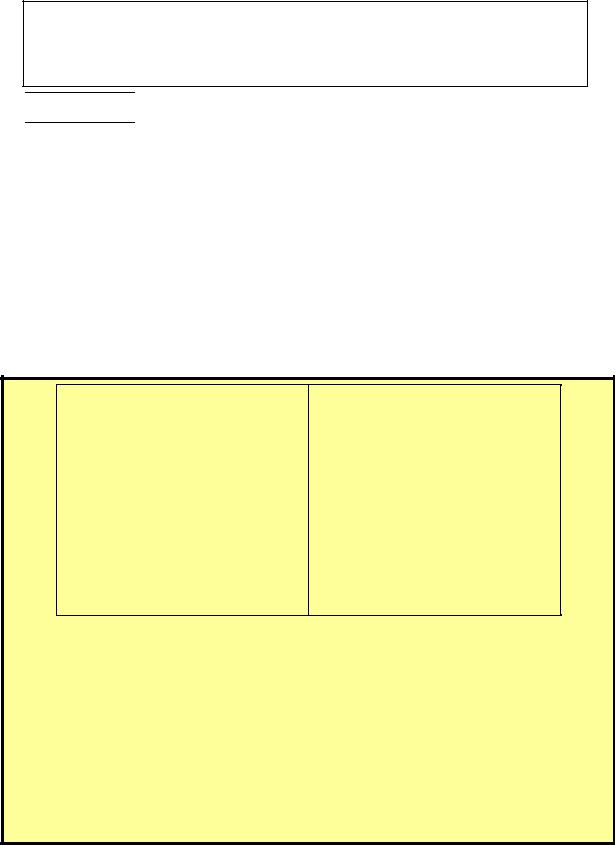
61
3. Write down the definitions to the following words and expressions using
different sentence patterns:
sewer system, civil engineer, water supply system, contractor, construction plan, software, fluid mechanics, AutoCAD drawing

 Imagine that you are a professional civil engineer. Read the following advertisement. Choose the position you would like to apply for. To get more information about each of the positions on offer surf the Internet http://www.kiwicareers.govt.nz/jbyi/famfrm.htm. Find the descriptions of the following jobs:
Imagine that you are a professional civil engineer. Read the following advertisement. Choose the position you would like to apply for. To get more information about each of the positions on offer surf the Internet http://www.kiwicareers.govt.nz/jbyi/famfrm.htm. Find the descriptions of the following jobs:
-HEATING, VENTILATION AND AIR-CONDITIONING ENGINEER
-CONSTRUCTION ENGINEER
-ROADING ENGINEER
Company: Leap 33
Job Title:
-HEATING, VENTILATION AND AIRCONDITIONING ENGINEER
-CONSTRUCTION ENGINEER
-ROADING ENGINEER
Regions: Greater London, South
East
Job Type: Permanent
Salary: Ј33,000 - Ј40,000 + car allowance + pension + healthcare + 23 days holiday
Background
Leap 33, one of the UK’s leading construction companies with a turnover of over £1.5 billion is looking for:
-HEATING, VENTILATION AND AIR-CONDITIONING ENGINEER
-CONSTRUCTION ENGINEER
-ROADING ENGINEER
to work on new build projects based in the London and Middlesex areas.
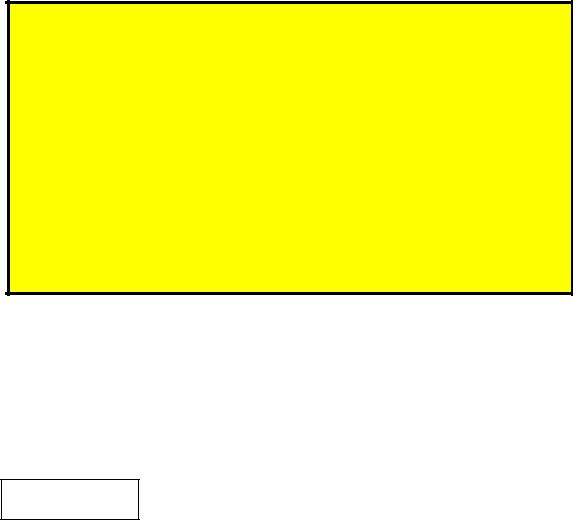
62
2. Make up your CV (resume) and write a letter of application for the chosen position using some of the expressions from the Useful language box.
Useful language
Dear Sir or Madam,
With reference to your advertisement in …I would like to apply for the position of ….
I feel I am well qualified for the position because ….
I would be happy to give you more details and can be contacted at any time.
I would be happy to come for an interview at any time convenient to you.
I enclose a copy of my CV/ A full CV (is) attached.
3.Work in 3 teams. Each group represents managers of the personnel department choosing the most suitable candidate for one of the positions listed in the advertisement. Discuss the strengths and weaknesses of each candidate. Note down reasons for your choice and present it to the other team.
4.
Activity 6
To behave efficiently at the interview you have to know how to ask and answer questions politely.
1. Match the rules 1-4 with the examples a-d below.
1. If who/what/which is the subject of the sentence, we do not use do/does/did.
2. Direct questions are usually made by putting an auxiliary verb before the subject.
3.We often use indirect questions to ask for information or to be polite. The word order is different from a direct question. We often begin indirect questions with
63
expressions like Do you know… Could I ask you…Could you tell me…Would you
mind telling me…I’d like to know… etc.
4.When a verb phrase has no auxiliary verb (I live in Paris), the question is made with the auxiliary do: Do you live in Paris?
Examples:
a). When can you come to the interview? b). Do you work in sales?
c). Who got the job?
d). Do you mind if I ask you what your weaknesses are?
2. For each direct question below tick the correct indirect question.
1). What are your strengths?
a). Could you tell me what your strengths are? b). Could you tell me what are your strengths?
2). What would your colleagues say about you?
a). I’d like to know what would your colleagues say about you. b). I’d like to know what your colleagues would say about you.
3). How have you changed in the last five years?
a). Could you tell me how you have changed in the last five years? b). Could you tell me how have you changed in the last five years?
4). Do you work in the construction industry?
a). Could I ask you if do you work in the construction industry? b). Could I ask you if you work in the construction industry?
3. To make a decision on the best person for the job, the company needs to find out about these four areas:

64
the skills the candidates have
their personality
their experience
their expectations
a. Look at the questions below. Which of the four areas is each of the questions asking about?
1)Do you think you are a natural comunicator?
2)What did you like most about your last job?
3)How do you try to motivate the people that you manage?
4)How do you spend your free time?
5)What kind of job would you like to have in five years’ time?
6)Why did you leave your last job?
7)What are your weak points?
8)How much do you expect to earn?
b.Turn the direct questions into indirect ones.
c.Think of at least one more question to ask about each area.
Activity 7 |
|
Role Play |
1. Work in pairs: |
|
|
|
|
Pairs A are interviewers.
Pairs B are candidates (interviewees).
Pairs A. Work on the questions that interviewers are supposed to ask and prepare to answer the candidate’s questions about the company Leap 33 (See Supplementary
Materials). Swap the questions and discuss them together in the class.

65
Pairs B. Make up a list of questions you are going to ask the interviewers about the company Leap 33 and the job, think of the questions interviewers might ask you, prepare to answer them.
Swap the questions and discuss them together in the class.
2.Role play the job interview situation. Use your CVs and letters of application.
3.When you have finished the interview, complete the following evaluation sheet for the candidate you’ve interviewed. Would you employ him or her? Why/ Why not? Discuss your reasons with the candidate.
EVALUATION SHEET
Position………………………………………………………………….
Name of candidate………………………………………………………
Score
BACKGROUND |
|
Education: |
____ |
Languages: |
____ |
Experience: |
____ |
BEHAVIOUR AND COMMUNICATIVE ABILITY |
|
Physical Presentation: |
____ |
Communicative skills: |
____ |
Ability to listen: |
____ |
Humour: |
____ |
Culture: |
____ |
Maturity: |
____ |
Manners: |
____ |
PERSONAL QUALITIES |
|
Ambition: |
____ |
Organisational skills: |
____ |
Leadership: |
____ |
Team Spirit: |
____ |

66
Discuss with your partner the following questions:
Activity 8
1.When choosing a candidate for a job, which is more important – qualifications or personal qualities?
2.What do you hope to do in the future in your career?
3.Do you think there is an ideal career for you? What is it?
4.What is the best advice you have ever been given about your future career?
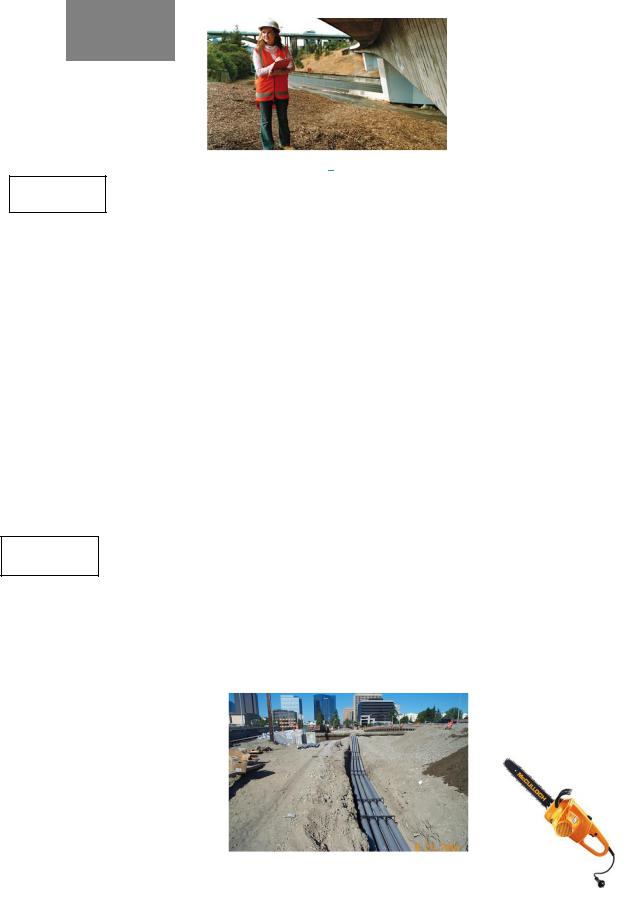
67
On a construction site!
Unit 6
Have you ever worked on a construction site? If yes, what did you do?
What were your responsibilities? If not, what can students usually do during their practical work on the construction site?
Useful language
I worked as a… |
… plasterer/ bricklayer/ (house)painter/ |
|
carpenter/ paperhanger / general worker/ |
|
loader, etc. |
I dealt with… |
… putting (pipes, bricks, windows and |
|
doors…) in place |
I was involved into… |
… digging (trenches, …) |
I was responsible for… |
… assembling (wooden frames, …) |
|
|
What equipment did you use or see on the construction site?
Activity 1
Look at the photos. Which photo shows…?
a. |
a truck-mounted caterpillar front-end loader |
|
||
b. |
utility conduits |
|
|
|
1 |
|
|
||
|
|
|
|
2 |
c. drainage piping |
|
|
||
|
|
|
||
d. a backhoe |
|
|
|
|
|
|
|
||
e. a power saw |
|
|
|
|
f. a hammer |
|
|
|
|
g. a construction |
|
|
|
|
|
site |
|
|
|
h. a truck |
|
|
|
|
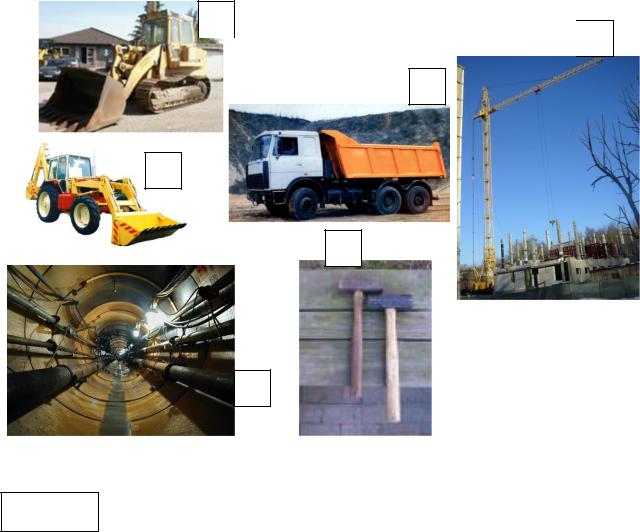
68
3 
 4
4
5
6
8
7
You are going to read an extract from the novel “The Stars Shine Down” written by the world’s master storyteller Sidney Sheldon.
Lara, the main character of this book, deals with real estate investment. In this extract she is watching her first building being constructed.
1. Before reading match the words to their Russian equivalents:
gridiron |
ось |
|
|
hub |
земляные работы |
|
|
trench |
трубопровод, кабелепровод |
|
|
grading |
решетка |
|
|
utility conduit |
котлован, траншея |
|
|
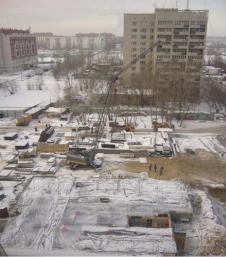
69
2. Read the extract and choose the best answer to the following questions (find
proofs in the text).
1.What is Lara’s occupation?
a)a builder
b)a contractor
c)a building owner
d)an architect
2.How would you describe Lara’s emotional
state? Why?
a)indifferent
b)excited
c)bored
d)enthusiastic
“Watching the new building going up was the most exciting thing Lara had ever experienced. She was there every day. “I want to learn”, she told Charles Cohn. “This is just the beginning for me. I’m going to put up a hundred buildings.”
Cohn wondered whether Lara really knew what she was getting into.
5
The first men to set foot on the project site were members of the survey team. They established the legal geometric borders of the property and drove hubs into the ground at each corner, every hub painted with a fluorescent color for easy identification. The survey work was finished in two days, and early the following morning, heavy earthmoving equipment – truck-mounted Caterpillar front-end loader – arrived at the
10 site.
Lara was there, waiting. “What happens now?” she asked Buzz Steele. “We clear and grub.”
Lara looked at him. “What does that mean?”
